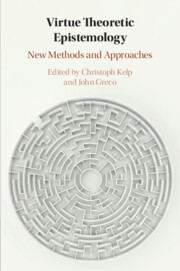Book contents
- Virtue Theoretic Epistemology
- Virtue Theoretic Epistemology
- Copyright page
- Contents
- Figures
- Contributors
- Acknowledgements
- Introduction
- Chapter 1 Closed-Mindedness As an Intellectual Vice
- Chapter 2 Epistemic Virtues and Virtues with Epistemic Content
- Chapter 3 Difficulty and Knowledge
- Chapter 4 What Is Epistemic Entitlement?
- Chapter 5 Knowledge-Producing Abilities
- Chapter 6 Virtue Epistemology, Two Kinds of Internalism, and the Intelligibility Problem
- Chapter 7 Knowledge Is Extrinsically Apt Belief
- Chapter 8 Explaining Knowledge
- Chapter 9 Anti-risk Virtue Epistemology
- Chapter 10 Responsibilism within Reason
- Index
- References
Chapter 1 - Closed-Mindedness As an Intellectual Vice
Published online by Cambridge University Press: 16 July 2020
- Virtue Theoretic Epistemology
- Virtue Theoretic Epistemology
- Copyright page
- Contents
- Figures
- Contributors
- Acknowledgements
- Introduction
- Chapter 1 Closed-Mindedness As an Intellectual Vice
- Chapter 2 Epistemic Virtues and Virtues with Epistemic Content
- Chapter 3 Difficulty and Knowledge
- Chapter 4 What Is Epistemic Entitlement?
- Chapter 5 Knowledge-Producing Abilities
- Chapter 6 Virtue Epistemology, Two Kinds of Internalism, and the Intelligibility Problem
- Chapter 7 Knowledge Is Extrinsically Apt Belief
- Chapter 8 Explaining Knowledge
- Chapter 9 Anti-risk Virtue Epistemology
- Chapter 10 Responsibilism within Reason
- Index
- References
Summary
What is closed-mindedness, and if it is an intellectual vice, what makes it so? This is the second in a series of three papers on closed-mindedness. It adopts a working analysis of closed-mindedness as an unwillingness or inability to engage seriously with relevant intellectual options. It distinguishes between three different kinds of intellectual vice – effects vice, responsibilist vice, and personalist vice – and argues that closed-mindedness can take each of these forms.
Keywords
- Type
- Chapter
- Information
- Virtue Theoretic EpistemologyNew Methods and Approaches, pp. 15 - 41Publisher: Cambridge University PressPrint publication year: 2020
References
- 6
- Cited by



